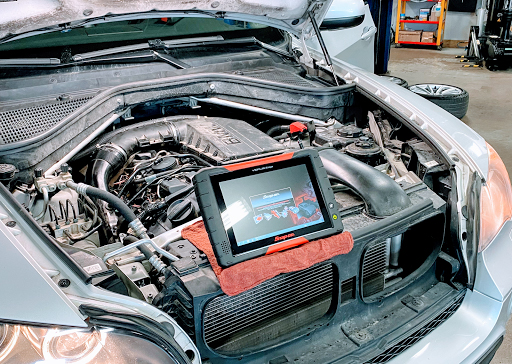
Strange Car Noises in Mississauga and What They Mean
You’re driving down Hurontario Street in Mississauga when you suddenly hear a squeal, rattle, or grinding noise coming from your car. Your first thought? “That doesn’t sound good.” Strange car noises are more than just an annoyance—they’re warning signs that something under the hood, beneath the car, or inside the wheels needs attention.
Ignoring these sounds can lead to bigger (and more expensive) problems down the road. In this guide, we’ll explain the most common noises Mississauga drivers hear, what they mean, and when to bring your vehicle to a professional mechanic.
What you’ll learn:
The top strange noises cars make and their most likely causes
How to identify whether a sound is urgent or minor
Simple steps you can take before visiting a repair shop
Local tips for Mississauga drivers dealing with these issues
Common Strange Car Noises and Their Meanings
Every unusual noise tells a story. Here are the most common ones Mississauga drivers report and what they often mean.
1. Squealing or Screeching When Braking
Possible Cause: Worn brake pads or rotors.
Why It Matters: Brakes are critical for safety. Squealing means the brake pad wear indicators are scraping, warning you it’s time for service.
Local Factor: Stop-and-go Mississauga traffic accelerates brake wear.
2. Clicking or Popping When Turning
Possible Cause: Damaged CV joints or worn suspension parts.
Why It Matters: If ignored, these parts can fail, leaving you with steering or handling problems.
Local Factor: Potholes and rough winter roads increase stress on suspension systems.
3. Grinding Noise While Driving
Possible Cause: Metal-on-metal contact, often from brakes worn past the pads, or wheel bearing failure.
Why It Matters: This is a severe safety concern that can damage your rotors or lead to wheel instability.
4. Hissing or Whistling from the Engine
Possible Cause: Vacuum leaks, radiator hose issues, or exhaust leaks.
Why It Matters: These can cause overheating or poor engine performance if left untreated.
5. Knocking or Pinging Under the Hood
Possible Cause: Poor fuel quality, incorrect spark timing, or engine wear.
Why It Matters: Persistent knocking can damage pistons and cylinders.
6. Rattling Under the Car
Possible Cause: Loose exhaust system, heat shields, or suspension components.
Why It Matters: While sometimes minor, rattling often signals parts are loose and at risk of falling off.
Unusual noises in a car can indicate a range of mechanical issues, some of which are safety-critical. Squealing brakes often point to worn pads or rotors, which are essential for safe stopping. A clicking sound while turning is commonly caused by faulty CV joints or suspension components, affecting steering and handling. Grinding noises may signal brake failure or worn bearings, posing an urgent safety risk. Hissing or whistling sounds can result from vacuum or radiator leaks, potentially leading to engine overheating or poor performance. Knocking or pinging noises often stem from engine or fuel-related problems, which can cause serious engine damage if ignored. Lastly, rattling typically suggests a loose exhaust or suspension part, which may lead to further mechanical failure or persistent noise.
How to Troubleshoot Strange Car Noises
While a mechanic should confirm the exact issue, here are practical steps Mississauga drivers can take when hearing unusual noises.
Step 1: Identify When the Noise Happens
Does it occur while braking, accelerating, idling, or turning?
Note the conditions (cold mornings, highway speeds, etc.).
Step 2: Localize the Sound
Try to determine if it’s from the front, back, under the hood, or underneath.
Have a passenger listen too—it helps pinpoint location.
Step 3: Perform a Quick Visual Check
Look for loose parts, fluid leaks, or worn tires.
Check brakes visually if the wheels are exposed.
Step 4: Don’t Ignore Warning Signs
Loud or repetitive noises (especially grinding or knocking) should be addressed immediately.
If the sound is worsening, avoid driving until inspected.
Step 5: Schedule a Professional Diagnostic
Mechanics can perform tests and use diagnostic tools to identify root causes quickly.
Local shops also understand common Mississauga issues (pothole damage, salt corrosion, etc.).
Frequently Asked Questions
Why do my brakes squeal in the morning?
Moisture and light rust can cause squealing at first, but if it happens consistently, your brake pads may be worn.What does a rattling sound under my car mean?
Often it’s a loose exhaust or heat shield. While not always dangerous, it should be checked before it worsens.Is a clicking noise while turning serious?
Yes. This usually points to worn CV joints, which can fail and leave your car unsafe to drive.Can bad fuel cause engine knocking?
Yes. Low-octane or poor-quality fuel can cause knocking, especially in older engines. If it continues, it may signal deeper engine issues.When should I see a mechanic for strange noises?
If the sound is loud, persistent, or accompanied by changes in performance (like poor braking or steering), see a mechanic right away.
Conclusion
Strange car noises aren’t just irritating—they’re your car’s way of telling you something is wrong. From squealing brakes to rattling exhausts, every sound has a cause. Catching the problem early saves you money and keeps you safe on Mississauga roads.
What to do next:
Pay attention to when and where the noise occurs
Don’t wait for the sound to get worse—early fixes are cheaper
Book a diagnostic with a trusted Mississauga auto repair shop
Need help today? Contact Skyline Automotive Service in Mississauga to schedule an inspection. Our experts can quickly identify the source of the noise and get you back on the road safely.